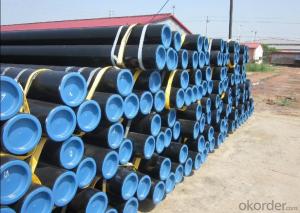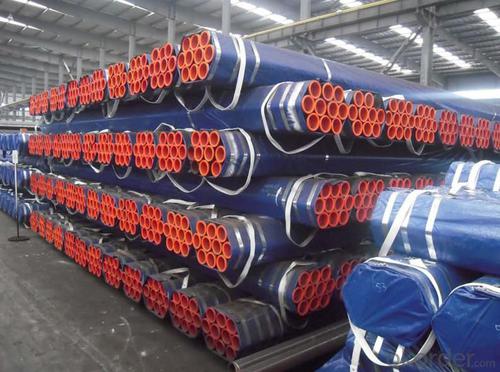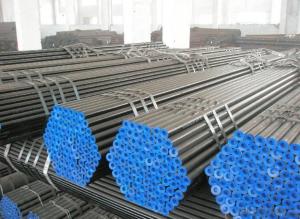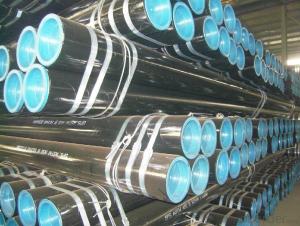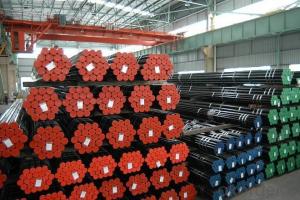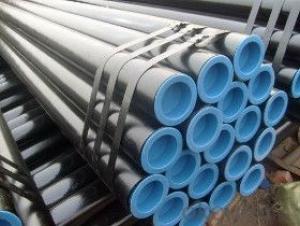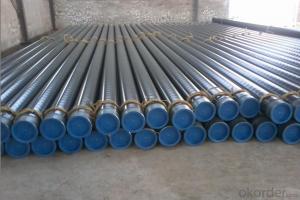Seamless pipe API,GB,ASTM,ASME,DIN high quality
- Loading Port:
- Tianjin
- Payment Terms:
- TT OR LC
- Min Order Qty:
- 10 m.t.
- Supply Capability:
- 5000 m.t./month
OKorder Service Pledge
OKorder Financial Service
You Might Also Like
1. Commodity Name: Seamless steel pipe
2. Standard: API,GB,ASTM,ASME,DIN
3. Quality grade: 10#, 20#, A106B, A53B, API 5L B, Q235, Q345, ST37-2, ST 45, ST52.etc.
4. Dimension:
OD: 1/2"-24"
WT: 2.5-80mm, SCH10~SCH40~XXL
length: 5.8m,6m,8m,9m,12m
5. Technique: Hot Rolled/Cold Rolled/ Cold Drawn
6. application
carbon seamless steel pipes are widely used in gas, water and oil, transpotation;constructions;Bridge,highway,windows of model steel door; building materials;fences;heating facilities Fluid Pipe;conduit pipe,scaffolding pipe.etc.
7. Payment Terms: L/C D/A D/P T/T
8.packing and shipment
Packaged in bundles,as per customers' requirements, it can also bepackagesd as beveled ends, typed marking, black painting, plastic caps protection,woven bags packing
For 20" container the max length is 5.8m; For 40" container the max length is 12m. other options are available based on customer requests. Please discuss when placing orders.
9. Surface: painted with varnish;
10. Plastic caps at ends.
11. Tolerance: OD +1%/-1%
WT +12.5%/-10%
12. Chemical composition:
Models of Steel Pipes | Chemical Component | |||||||
Steel 20 (ASTM A106B) | C | Si | Mn | P | S | Cu | Ni | Cr |
0.17~0.24 | 0.17~0.37 | 0.35~0.65 | 0.035max | 0.035max | 0.25max | 0.25max | 0.25max | |
Steel45 (ASTM 1045) | 0.42~0.50 | 0.17~0.37 | 0.50~0.80 | 0.035max | 0.035max | 0.25max | 0.25max | 0.25max |
16Mn(Q345B) | 0.12~0.20 | 0.20~0.55 | 1.20~1.60 | 0.035max | 0.035max | 0.25max | 0.25max | 0.25max |
45Mn2 ( ASTM1345) | 0.42~0.49 | 0.17~0.37 | 1.40~1.80 | 0.035max | 0.035max | 0.3max | 0.3max | 0.30max |
- Q: How do you calculate the pipe volume flow rate for steel pipes?
- The pipe volume flow rate for steel pipes can be calculated using the formula: V = A * V_avg, where V is the volume flow rate, A is the cross-sectional area of the pipe, and V_avg is the average velocity of the fluid flowing through the pipe.
- Q: Can steel pipes be used for underwater applications?
- Yes, steel pipes can be used for underwater applications as they are known for their high strength, durability, and corrosion resistance, making them suitable for various underwater environments and industries such as offshore oil and gas, marine construction, and underwater pipelines.
- Q: What are the different methods of pipe threading for steel pipes?
- There are several methods of pipe threading for steel pipes, including manual threading, machine threading, and roll grooving. Manual threading involves using a hand-held die and a pipe vise to create threads on the pipe. Machine threading uses power-driven threading machines that can quickly and accurately create threads on steel pipes. Roll grooving, on the other hand, involves using a specialized machine that forms a groove on the pipe, eliminating the need for threading and allowing for easy installation of pipe couplings or fittings. Each method has its advantages and is chosen based on factors such as pipe size, project requirements, and efficiency.
- Q: Difference between seamless steel pipe and welded pipe
- Welded steel pipe for different welding process and divided into the furnace pipe welding (ERW) pipe and automatic arc welding, because of the different forms of welding seam welded pipe and spiral welded pipe is divided into two kinds, end its shape is divided into circular welded and shaped (square) pipe etc..
- Q: Can steel pipes be used for nuclear power plants?
- Yes, steel pipes can be used for nuclear power plants. Steel pipes are commonly used in the construction of nuclear power plants for various purposes such as transporting coolant, steam, and other fluids. Steel pipes offer excellent strength, durability, and resistance to high temperatures and pressure, making them suitable for the demanding conditions of nuclear power plants.
- Q: What are the different grades of steel used for manufacturing pipes?
- The different grades of steel used for manufacturing pipes vary depending on their intended applications. Some common grades include carbon steel, stainless steel, and alloy steel. Carbon steel is commonly used for general-purpose piping due to its affordability and strength. Stainless steel is preferred for corrosive environments or high-temperature applications due to its resistance to corrosion. Alloy steel, on the other hand, offers improved strength and durability and is often used for specialized applications such as oil and gas pipelines.
- Q: What is ND steel pipe?
- ND steel also has the ability to resist chloride ion corrosion. ND steel pipe, the main reference indicators (70 degrees Celsius, 50%H2SO4 solution immersion 24 hours), and carbon steel, Japan imported similar steel, stainless steel corrosion resistance compared to higher than these steel grades. Products by domestic refineries and manufacturing units after the use of widely acclaimed, and achieved good results.
- Q: How are steel pipes used in HVAC systems?
- Steel pipes are commonly used in HVAC systems for transporting hot or cold water, as well as other fluids like refrigerants and condensate. They are durable, resistant to corrosion, and can withstand high pressure, making them ideal for carrying fluids throughout the system. Steel pipes are typically used for water supply lines, steam distribution, and hydronic heating and cooling systems in HVAC installations.
- Q: Can steel pipes be used for oil refineries?
- Yes, steel pipes can be used for oil refineries. Steel pipes are commonly used in oil refineries due to their high strength, durability, and resistance to corrosion. They can handle the high pressure and temperature requirements of the oil refining process, making them suitable for transporting and distributing various petroleum products within the refinery.
- Q: How are steel pipes used in the manufacturing of pharmaceutical equipment?
- Steel pipes are commonly used in the manufacturing of pharmaceutical equipment due to their durability and resistance to corrosion. They are used to transport fluids, gases, and chemicals within the equipment, ensuring a safe and reliable flow. Steel pipes also provide a high level of cleanliness, which is crucial in pharmaceutical manufacturing to prevent contamination and maintain product quality.
Send your message to us
Seamless pipe API,GB,ASTM,ASME,DIN high quality
- Loading Port:
- Tianjin
- Payment Terms:
- TT OR LC
- Min Order Qty:
- 10 m.t.
- Supply Capability:
- 5000 m.t./month
OKorder Service Pledge
OKorder Financial Service
Similar products
Hot products
Hot Searches
Related keywords

